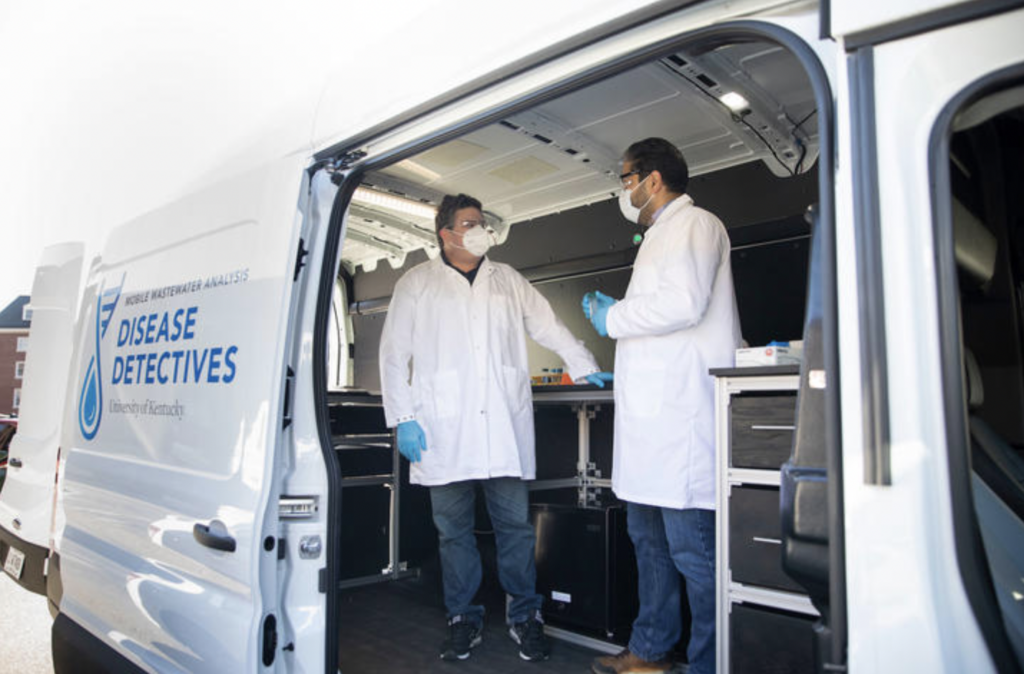UK medical and engineering teams will take new technology for testing wastewater for coronavirus to rural Kentucky this summer

—–
Throughout the pandemic, researchers from the University of Kentucky’s College of Medicine and College of Engineering have joined forces to track the virus’ presence in the community by testing wastewater.
The practice has seen limited use in the past as a public-health surveillance tool, but the pandemic has brought newfound interest due to its ability to monitor infection trends without extensive clinical testing, says Dr. James Keck, an assistant professor of family and community medicine.
“The investment in advancing wastewater testing is a reflection of the usefulness of this tool to give a comprehensive picture of the spread of infection, especially in rural communities with limited access to clinical testing,” Keck said.
Keck’s partner in two projects that have attracted $4.7 million in federal funding is Associate Professor of Mechanical Engineering Scott Berry, who invented a new technology that uses special beads to extract the RNA shed by the virus to make the process faster and more efficient.
The team’s first project, supported by an 18-month $1.3 million grant from the Centers for Disease Control and Prevention, is focused on testing wastewater from nursing homes.
The team has been testing wastewater daily at six nursing homes in the Lexington and Louisville areas using an automated sampling device. If a sample tests positive, facilities are notified and can take additional measures to prevent spread of the infection, including facility-wide clinical testing.
“Since wastewater testing can show the first signs of an outbreak in a community prior to detection in clinical samples, the early notice could help prevent Covid-19 infections and deaths in this vulnerable population,” Keck said.
The second project, funded by a $3.4 million grant from the National Institutes of Health, is aimed at advancing testing technology so that samples can be processed and analyzed on-site using Berry’s exclusion-based sample preparation (ESP) process.
Conventional wastewater testing sends to a lab so they can go through a complicated series of steps needed to extract the RNA before a polymerase chain reaction (PCR) test can be done.
With the help of engineering students, Berry and his team created a mobile lab to take wastewater testing to rural Kentucky. Equipped with ESP and loop-mediated isothermal amplification, the “Disease Detective” van has the capability to both process and analyze samples in the field.
Beginning this summer, the van will head to rural communities in Kentucky, where Berry’s team will train people to test wastewater at treatment plants, schools and streams.
In the meantime, Berry’s lab is processing weekly samples from wastewater treatment plants from eight counties. Local health officials are using the results to evaluate responses to the spread of infection. The hope is that the ESP technology will eventually allow wastewater treatment plant operators to do the testing, Berry says.
In addition to the training, the team is partnering with UK’s College of Education on another project that will use the mobile lab to teach local students about wastewater testing and get them excited about science, technology, engineering and mathematics.
It’s just another way the project has connected researchers from different disciplines who otherwise may never have worked together, Keck says.
“Basic-science researchers and engineers are working with public-health officials to have real impact in communities across Kentucky,” Keck said. “These projects utilize expertise and resources across many disciplines, bringing UK’s mission as a land grant institution into service.”